Why I voted for Vox
EL PAÍS travels to the places where Spain’s far-right party made the greatest gains at the November 10 election to find out what its supporters are like, and what they hope to gain from their vote. What emerges is a complex picture that cuts across age, social background and even ideology

1. The awakening
As we enter the Murcia region, the sky becomes leaden. The area is on orange alert for severe weather conditions. There were several fatalities during the storms of last September, when torrential rains ruined crops and flooded streets and homes. There was millions of euros worth of damage, and the Mar Menor saltwater lagoon became poisoned, resulting in a carpet of dead marine life being washed ashore.
The first drops of rain darken the tarmac as we enter a roadside café to meet Daniel Ruiz, 45, a divorcé with two children who works as an agricultural engineer, and not only votes for Vox but is also a party member.
As a consultant and supervisor for a citrus fruit company that has dozens of hectares of land between Murcia and Almeria, he spends his days driving between crops and is today dressed for the bad weather, in a raincoat and boots.
He says that the first thing that attracted him to Vox was the video of Alejo Vidal-Quadras’ elephant. In the footage, the well-known Popular Party (PP) politician, who was also the co-founder and short-lived president of Vox (he quit the party in 2015), explains in cartoon format that one of Spain’s main problems is its bloated administration. “The elephant is the state,” he says. “That complex, enormous, inefficient mess.”
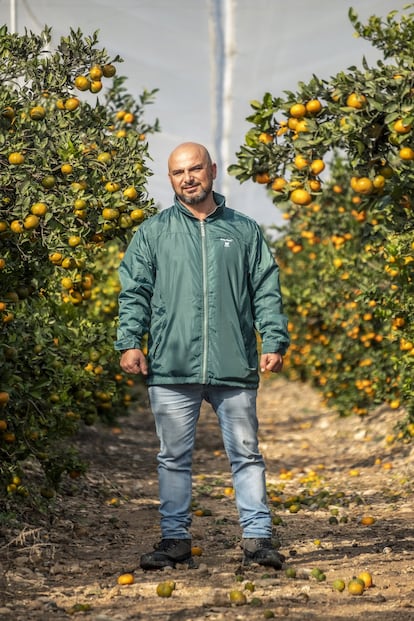
The video talks about autonomous regions, town halls, provincial authorities and public companies and concludes that there is a “put-upon majority that works more than six months each year just to feed the elephant and the self-satisfied bunch that ride it.” His solution is to change the elephant for a horse.
“That message spoke to me,” says Ruiz. “Vox was sympathizing with those of us who were working. The PP had been leaving us – the productive sectors, the families – to our own devices. The middle classes were disappearing. Most of the Vox vote is from those of us who suffered the fallout from the crisis. That’s quite obvious to me.”
Not only did Vox reel in Ruiz as a voter, but in 2015 he also became the party’s regional candidate, though he attracted less than 1% of the vote. He was also a deputy regional secretary for the party until a year ago.
Ruiz defines himself as “moderately conservative” on the ideological front and “liberal” on economic issues. Until 2011, he had been voting for the PP. He is a resident of San Pedro del Pinatar, where Vox got 33.93% of the vote at the November 10 general election. Ruiz does not shy away from controversial issues, such as “this radical feminism we are seeing.” He believes that “gender ideology violates the constitutional right to effective equality.”
“More and more women are sympathizing with Vox because they value their own safety and the safety of their children,” he adds. “They want to be able to walk down the streets in peace. They don’t want packs of criminals to be allowed to roam free. They take a poor view of people who do not enter [Spain] through legal channels, whether or not they are minors, and then wander freely through the streets.”
Regarding climate change, Ruiz says: “Look, we can’t control the climate. I’m not a denier. I just see climate change through the eyes of a human being. The climate changes, yes. And people are human, yes. And that’s the way it is, whether we like it or not.”
That same night, thunder can be heard as we talk to Ana, an assumed name used by a 35-year-old soldier from the San Javier air base in Murcia for the purposes of this article. A Vox voter who is married and has three daughters, she speaks about “order, security and authority” as things that are missing in politics, on the streets and in schools. She is concerned about Catalonia: “We need to make things clear up there,” she says. And she complains about the children of migrants, saying there are hardly any Spanish students left at her children’s school. Previously, she has voted for the PP and for the center-right Ciudadanos (Citizens). Her salary and that of her husband amounts to a combined €2,200 a month. Theirs is a no-frills lifestyle, she says, before proceeding to attack politicians. “How do they live? Vox is proposing to reduce the number of freeloaders.”
2. A returning emigrant
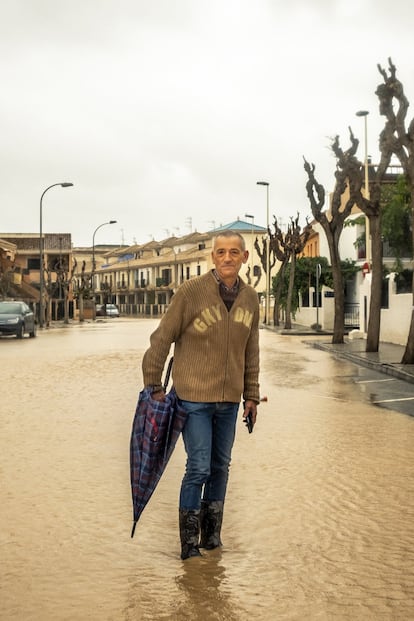
Manuel Aroca holds a cigarette in one hand and an umbrella in the other as he wades through the flooded streets of Los Alcázares, Murcia, against the strong undercurrent pulling him toward the sea. The European middle classes flock here in the summer.
Aroca, 64, is a retired metal worker who has recently returned to his native Spain from Germany. Until now, he says he was always a committed socialist. But when the November general elections came around, he changed his vote. “I sometimes think that Franco should come back,” he says. “We want solutions.”
Aroca emigrated as a teenager, when he left the country with his family, returning to Murcia almost 50 years later to retire on his German pension. He settled in with his mother in the small house where we meet. They are among the few who live here all year round. He has been keeping an eye on his neighbors’ properties for them, and he tells them by phone about the state the storm has left them in. Garages have been submerged and sidewalks have turned into waterfalls. The recent rains have compounded the damage done in September, and Aroca speaks of the weather conditions as though they were key to his vote. “We feel helpless,” he says.
Since his return to Spain in 2018, he has seen things he doesn’t like. “Let’s see if voting for Vox will make someone turn this around,” he says. He’s talking about what he calls “the mess in Catalonia” and also his desire to see immigrants sent home. “And for instance take my mother, you’re walking down the street and they snatch your purse...” Aroca’s mother mentions a robbery committed some years back by “moros” – North Africans – and describes another incident with “some Romanian women.” In Aroca’s view, “you are not safe out there. I feel afraid. I feel like it isn’t safe. And immigrants… they should come, but with a job contract as we did in Germany.”
Asked if he was subject to discrimination in Germany, he says he was. “At first we were not wanted anywhere,” he says. “As far as the Germans were concerned, we were going to take their jobs.”
Asked if this is the same as what is going on now in Spain, he agrees. “Yes, it’s more or less what happened to us. But I’m not interested in that now. I’ve retired here, and what worries me is the crime – the fact that a woman cannot go out at night.”
3. The unemployed
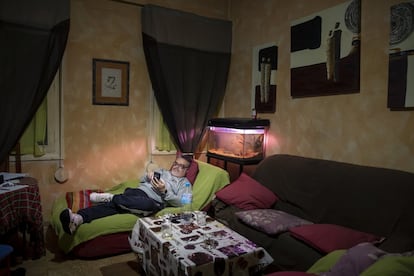
The road to Cartagena is like a real estate graveyard, strewn with the skeletons of half-built homes. With the Mar Menor providing the backdrop and the black clouds overhead, it’s not unlike the set of a science-fiction movie.
The crisis hit this area particularly hard. In 2011, Murcia was among the regions with the highest unemployment rate within the construction sector and the steepest slide in property sales. By 2014, almost half the population was at risk of falling into poverty. That number has fallen but there is still a third who are perilously close to the poverty line.
“People here come by plane, on makeshift boats, any way they please. This place is a free-for-all,” says Carlos Marquez, 49, an unemployed Vox voter and card-carrying member from Cartagena. “What’s the solution? Anyone who has been here for more than two years without working, without contributing, should leave. Criminals who are foreign nationals must be sent back to their country. The way things are, as soon as they land here, they get 650 bucks. They’re taking advantage of the system. They don’t assimilate. And they bring their wife and five kids thanks to family-reunification policies. No country can deal with that.”
People here come by plane, on makeshift boats, any way they please. This place is a free-for-allCarlos Marquez, 49
Márquez lives in an apartment in a modest-looking building. The entrance hall is full of junk. His dog, which tears around the living room as we speak, is named Sori, a Japanese word that describes the curvature of Samurai swords. There are katanas – Japanese swords – hanging everywhere. The TV is on. There is a pile of photocopies of his resumé on the table.
Márquez sits on the couch by the fish tank. His glasses have thick lenses that make his eyes look tiny. He is wearing sweatpants and a martial arts sweatshirt – he has a black belt in jiu-jitsu.
Divorced and childless, he has gone from job to job – carpenter, waiter, sailor, diver, martial arts instructor, salesman, bodyguard, security guard and entrepreneur. Then things got bad. “We are a very poor region,” he says. He joined Vox because he buys into “70% of their ideology.” The other 30% is not his thing because it has to do with religion. He doesn’t like how the party, in Murcia, has become an “elitist club, managed by the [Catholic organization] Opus Dei and posh kids from Murcia.”
In 2019, he filed a complaint against three Vox leaders in Murcia, alleging embezzlement. He claims to have done his bit in forcing the party’s regional leadership to resign two weeks after its victory on November 10. Márquez himself left the party a few weeks after this interview.
In his opinion, while Spain is not quite in a pre-Civil War mood, he is sensing what he terms “confrontation between Spaniards.” He also has views on the subject of “feminazis,” a recurring theme for Vox. “A woman does not have to drop her panties and pee in the street or show her tits in order to assert her rights.” He talks about publicly funded feminist organizations as shady outfits and says: “They don’t represent me, and I’m a feminist.”
I compare the TV news with what I get elsewhere, which is fact-checked information, and it doesn’t coincide at allCarlos Marquez, 49
Asked where he gets his news from, he says he hasn’t watched the news for a while “because we are being lied to.” He prefers to get his information from Facebook, friends, social media and “from certain groups I’m in that are more reliable.”
“I compare the TV news with what I get elsewhere, which is fact-checked information, and it doesn’t coincide at all,” he says.
“Call me a conspiracy theorist,” he says about the conflict in Catalonia, which he believes will be resolved fast enough when “it stops being useful to them.” Asked who “them” might be, he replies, “Bilderberg, Soros, people of that stature,” alluding to the Hungarian-American financier George Soros and to the Bilderberg Meetings, an annual private gathering of global leaders. Vox leader Santiago Abascal has cited these same names in the past, claiming they are seeking to sow “chaos” in Europe and “eliminate” the middle class.
Márquez then takes a small figurine of the Spanish dictator Francisco Franco from a cupboard next to an incense burner and his jiu-jitsu certificate. “Uncle Paco,” he says. “A controversial man. I don’t find him disagreeable. There was no terrorism under Franco. Terrorists were shot. Now you have terrorists on public salaries in the Basque Country.”
4. The foremen
Loubna Hamdai is not a Vox voter. She is a Moroccan-born intercultural mediator who works in Torre-Pacheco, Murcia, a agricultural town of 36,000 residents, 26% of whom are immigrants. We have just been introduced to her at a meeting with NGO leaders where speakers talked about “a breeding ground” for Vox voters: “The crisis has increased poverty, which turns migrants into scapegoats. They are beginning to be perceived as rivals for resources, which are scarce.”
Loubna takes us to the fringes of town, a grey slum where the inhabitants are mostly migrants and the housing is substandard. A man passes us pushing a shopping cart loaded with plastic drums and five-liter water bottles. He says his name is Félix Pérez and he is 50 years old. His hair is tied up in a ponytail and he has a tattoo of a horse on his neck. He is a blacksmith and a horse trainer. “Well, I used to be,” he says. “I don’t have any work now.”
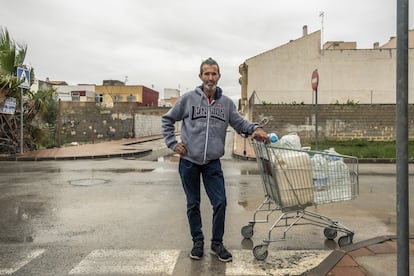
Félix is recovering from cancer, but the radiation therapy has left him weak. He can’t even afford to fix his loose dentures, he says, putting them back in place with his fingers. “I’ve had some bad times in my life, but never as bad as this this,” he says.
He has just filled up his water bottles at a neighbor’s house because his own supply has been cut off. He has no income, although he hopes to soon start receiving the basic state subsidy of €430 a month. Before the November elections, he had not gone to the polls for 25 years. But this time he voted for Vox. “What made me vote? The fact that this cannot go on. The fact that every day the fat cats get fatter and those who are weak, like me, find themselves getting weaker. I think Vox cares more about the underprivileged than the other parties.”
Félix can remember when he heard about the party for the first time. “It was in the bar where I was eating with a [charity group] Cáritas food voucher, as I don’t even have enough money to pay for food. That day, a man put a Vox sticker on me here.” He points to his chest. Then he continues on his way, pushing the cart and disappearing into the distance.
The outskirts of Torre-Pacheco, where Vox got 38% of the vote last November, is a succession of vegetable fields growing artichokes, lettuce and broccoli. About 30 women are bent over, pulling weeds from a field of arugula on a hillside. They are small but strong – mostly migrants from Latin America. As soon as they pause to talk to us, the foremen’s jeep shows up, carrying two Spanish men wearing muddy boots; Vox voters. “There are a number of problems in Spain that everyone sweeps under the carpet,” says one, who prefers not to give his name. “But Vox tells it like it is: they say what everyone is thinking, and in a way that is easy to understand.”
“How can there be so much immigration when there is so much unemployment?” wonders the second man. The pair of them stand and smoke while the sun goes down and, in the creeping shadows, the women continue at their task.
5. The poorest 1%
Níjar, in the southeastern province of Almería, has the lowest income in Spain for a town of more than 20,000 residents. There is a drab road in town that is reminiscent of the Wild West, and on it there is a bar that flies a Spanish flag to distinguish it “from the Nigerian ones, and the Moroccan ones over there,” according to the owner. The immigrant population is 41% of the total, and the average income is just over €6,000 a year. Vox won 35% of the vote in this neck of the woods. The bar with the flag is located in a census area that is home to the poorest 1% of the entire country. Next to it is a gambling den called Joker where bicycles – the standard mode of transportation for migrant laborers – are stacked at the door. Inside, everyone seems to be a foreigner. They speak Spanish in a variety of accents. The person running the joint says that his customers usually share any prize money with each other in a show of solidarity.
Outside, Arab men walk by in djellabas while sub-Saharan Africans ride their bicycles. As they pass the wall of an irrigation channel, their silhouettes are briefly superimposed on graffiti that says: “Vote for Vox”.
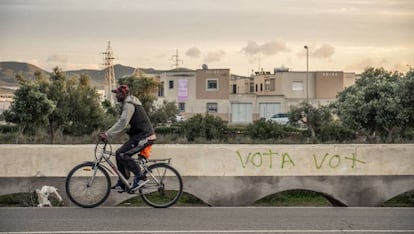
At La Unión market, José Salazar, a 42-year-old truck driver, talks as if the world he grew up in was fading away. “Things used to be good. We had work,” he says. “We were able to feed our children, pay our mortgages, live a little better.” Then, he adds, “immigration came and, I don’t blame them, but the work is drying up. We don’t want a dictatorship, but we do want a party that doesn’t take us for a ride. The working middle class gets no support. First you have to feed those who are right here at home, and then, if there’s anything left over, you can feed those from abroad.
“The only party that is listening to the people is Vox,” adds José. Francisco Martín, a 45-year-old agricultural engineer, nods in agreement. “I find what [Vox spokesperson in Congress] Iván Espinosa de los Monteros says very interesting: ‘To create wealth, you have to lower taxes,’” he observes.
Nearby, in the city of Almería, 24-year-old José Esteban has just had his head shaved at his Dominican cousin’s barber shop. At the door, he takes a video and posts it on Instagram with the line: “I’m a Vox activist!”

Esteban describes himself as “a half-migrant.” The son of a Dominican and a Spaniard, he stresses that the video was a joke. But he did vote for Vox back in November. And he did so because of immigration. “I don’t think it’s good to give subsidies to foreigners when the Spaniards who really need them are not being supported. And there is more violence perpetrated by immigrants,” he says.
I express surprise at this attitude given his own background. “When I was little I used to hang out with migrants and everything went badly for me,” he notes. “There are good ones, but they are a minority. If you are stealing or raping, stay in your own country. They don’t do any good here.”
6. The Vistalegre women
Cloti and Oti are two friends from Roquetas de Mar in Almería who went together to Vistalegre “Plus Ultra,” a Vox event held in October 2019 in Madrid which brought together more than 10,000 people on a pledge to “defend Spain and its unity, its sovereignty and freedom against the progressive dictatorship.”
That was just one month before the elections that made Vox the third-largest force in parliament with 3.6 million votes. The women still have good memories of the trip. “It was you who made me go,” says one. “And now you’ve set me up for this interview,” says the other. “Barça one, Real Madrid one!”
Dr Clotilde Cerrudo, 50, has a husband, two daughters and a private clinic. She also has a villa with a pool where we are invited to drinks and snacks. “I voted for Vox because I think it’s a party that brings hope and stands for what I’ve always believed in,” she says. “It’s pro-life. It’s in line with my religious values and my work.”
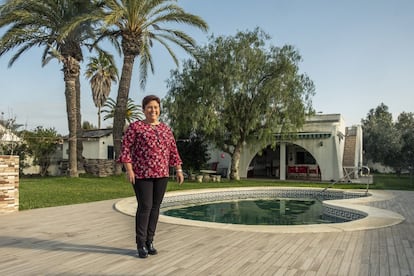
She discovered Vox through her patients prior to the 2018 Andalusian elections, when the party first secured seats in a regional parliament. Disappointed by the PP’s “drift” in morality and its defense of Spain, she decided to sign up as a member of the party. She had never been involved in politics before, but Vox’s claim of being self-financing was also a pull. “An ordinary citizen should not have to pay for the propaganda of any party,” she says.
Cloti is an active member of her parish and neighborhood association. She was a missionary in Honduras. At the entrance to her house there is a print of José María Escrivá de Balaguer, the founder of Opus Dei. On the subject of abortion, she says that current legislation has made it legal to all effects and purposes. “What does Vox say? Let’s try to reduce the number of abortions by providing comprehensive social assistance to women who do not want the child.” As for euthanasia, she says: “I can’t get my head around it.” With regard to feminism, her view is that “men and women are different – in biological terms, in our way of thinking, and in our sexual development. And I really do want to be different. I’m proud to be a mother. I don’t want to grow a beard. Where should we be equal? Under the law. I’m not a feminist.” And concerning gender-based violence, she says: “You can’t put a person in jail just because a woman claims she was assaulted.”
You can’t put a person in jail just because a woman claims she was assaultedDr Clotilde Cerrudo, 50
According to Cloti, “Vox reflects the ideas of a traditional person who has always discussed these issues at mealtimes.” For example, when it comes to education. “They can’t sell us a fiction. Heterosexuality is the norm, isn’t it? A man and a woman. Don’t give me a law that says that anything goes. You have to educate children with respect, seeking parental consent in schools. At home, I’m teaching them one set of moral and religious norms, only to have someone else come along and say, ‘No, it’s not like that.’”
On their Vistalegre trip, Cloti and Oti got their photograph published in digital media outlets. They are seen smiling behind a flag bearing the head of a wolf wearing a spiked collar with a face painted in Spain’s national colors and the word Vox is written in its eyes. Behind the animal there is the Burgundy cross, used by the Spanish Legion, an elite army unit. The wolf flag is also featured on the door of a bar in Roquetas, on the beachfront. Inside, it hangs beside the Spanish Legion’s flag. Vox supporters often meet here and the place is awash with Vox paraphernalia. There are “España Viva” bracelets, Santiago Abascal keychains and a badge costing €2.50.
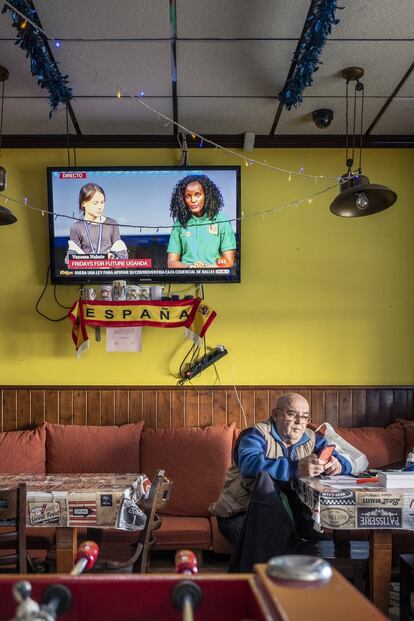
Otilia Peña, 51, works at a local hotel in the reservations and revenue department. While sipping a Coke, she explains what the flag stands for: “A wolf represents power. They always go together, united and strong,” she says. “For a long time, I didn’t know who to vote for. I had no identity. If you went around saying ‘I am Spanish’ you would get dirty looks. What attracted me was being told that my origins and traditions are a source of pride.”
She voted for Vox in the Andalusian regional elections in 2018 and signed up as a member the following day. “They are trying to brand Vox as an ultranationalist party because it defends unity and the nation,” she says. “This is because there’s fear of the number of us who have been silent until now.”
The owner of the bar, a military retiree, comes forward and says that he designed the flag himself. The wolf, he says, represents the fauna of the Iberian peninsula. The black background symbolizes a fight to the death. The tears are the Spanish flags. In other words, this wolf is crying for Spain.
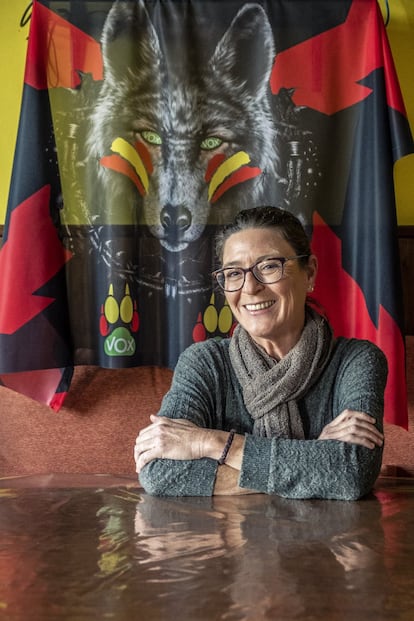
On closer inspection, another type of paraphernalia is evident in the bar: a Spanish flag from pre-constitutional days and Franco keychains.
“If he had quit 20 years sooner as head of state, it would have been better for everyone,” the owner says, referring to Franco. “I like him as an army general, though not in a nostalgic way. But what you can’t do in any case is draft a law to make the past disappear.”
“History is a part of us,” chimes in Oti.
To which the bar owner responds, “Above all, so as not to repeat it.”
7. Agricultural entrepreneurs
From a height, the shimmering “orchard of Europe” is very impressive, resembling a smudge of milk on the banks of the Mediterranean. Once on the inside, the sea of plastic in El Ejido, Almería, becomes a labyrinth of roads. A strip of asphalt runs along the coastline, and at the bottom of the ravine you can see Almerimar, a development with a marina and a home to agricultural entrepreneurs. There are barely any foreigners to be found there, income levels are the highest in the municipality, and voter support for Vox is around 40%.
To the left, the roads start to narrow, and there are billboards advertising “whitening” (of plastics). A pre-constitutional Spanish flag can be seen flying over one of the fields next to graffiti reading: “You bastard Pedro Sánchez. Franco isn’t the problem. You are the problem.”
Juan Plaza is the owner of that flag, and he is also the owner of a small greenhouse where cherry tomatoes grow, cared for by a handful of Moroccans. A “lifetime leftist voter,” he explains that he switched to Vox because it reflects “what the majority think, even if they’re unable to say it.”
Plaza is 62 years old, and he voices his complaints with a husky voice. “Setting up a greenhouse these days costs more than €300,000. How do you make your money back? How is it possible that you have to sell tomatoes for 60 cents a kilo and the final price is €6? You end up burnt alive. Ninety percent of the countryside is trapped,” he says.
Plaza confesses that he finds it hard to understand the world around him. We are speaking to him while the Climate Summit is taking place in Madrid, and Greta Thunberg has just crossed the Atlantic on her way to the event. “Look at that climate change girl,” he says. “How is she going to get there? On a donkey? On a mule to Madrid? It’s better not to talk about certain things because you just get too mad.”
Francisco Fernández, 51, is also an entrepreneur in the agriculture sector, as well as a water dowser. He links the support for Vox with the “stress and uncertainty” in the sector. He cites the tiny margins, competition from Morocco, and that the “big fish are getting bigger and bigger.”
“When the banks find out that a mid-size farmer is on the ropes, they get in touch with the big ones so that they can absorb that farm,” he explains. That’s why he voted for Vox, and that’s why he likes Trump. “The media treats him like he’s crazy, but he isn’t to me. I see him like a father, for whom his children are the priority.”
When asked about the shanty towns in which some migrants are living, he says: “They would rather be there than paying rent. Why? Because living like that they don’t have to pay anything. They save everything for the cooking pot and send money back to their country. Man, leave something here, generate some wealth at least.”
Among the first measures taken by local authorities in El Ejido, where a coalition of Vox and the PP has been in power since June 2019, was the demolition of these settlements. One of them is just a little further on from the Franco-era flag. Little huts made of waste plastic, pallets and PVC tubes have been been raised on a dry, sparse patch of land. A Moroccan man with a festering scab on his arm shows us his house and says repeatedly: “No work, no food.” A scrawny cat walks through a puddle containing a mix of urine, trash and pesticides. Occasionally the soft smell of tomatoes reaches your nostrils.
8. The self-employed
It’s dawn in the outskirts of Madrid and you can see crops, waste grounds and industrial buildings bordering housing developments. In this southern area of the Spanish capital – which is neither the countryside nor the city, neither Madrid nor Toledo, and where young families and elderly men in corduroy suits live side by side – there is barely a municipality where Vox won less than 25% of the vote. In many places it exceeded 30%.
Rafael Álvarez, 38, travels around the area every day on his tanker truck, delivering heating fuel oil to businesses and homes. This self-employed worker is married and has two children. He lives in Moraleja de Enmedio, where Vox was the most-voted for party at the November 2019 elections. We meet at the headquarters of MoraFuel Low Cost, a family-run gas station where the two pumps run 24 hours a day and there is a garage for the trucks. The Spanish flag is flying from the roof. Álvarez has a thick beard and is wearing an anorak jacket.
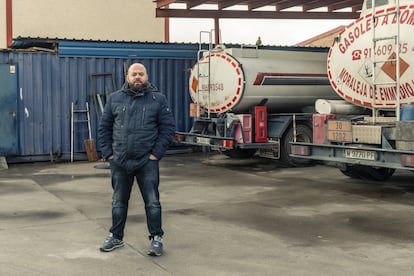
“You say that you voted for Vox and it’s as if you were carrying a photo of Hitler in your wallet,” he complains. In his opinion, this vote goes beyond ideology. It was punishment for the “political dinosaurs.” A thirst for “something new, that will bring change, that will try to renew and reform everything, because things are getting worse and worse.” He adds that he thinks that “Vox will look out for us more.” He says he is referring to “ordinary people,” “those of us who work,” such as himself and his own customers in the area. “We’re all the same,” he says. “We’ve got less and less money but we work more and more. You don’t have enough to last the month. All the taxes we pay, where the hell does it go? To the regional governments? Toward subsidies for people who are unproductive? [...] We’ve had enough. If I work more and have to pay more taxes, how do I manage it? How can I have a better life?”
We’ve got less and less money but we work more and more. You don’t have enough to last the month. All the taxes we pay, where the hell does it go?Rafael Álvarez
Following the knots of freeways to the south of Madrid, you get to Numancia de la Sagra, in Toledo, where there is an industrial park on the edge of a highway. In one of the warehouses, Salvador Sánchez puts on a safety harness and climbs onto a crane. He is adapting the building to safety regulations. He is also from Moraleja de Enmedio. He’s wearing grey coveralls and work boots and has big bags under his eyes. Forty-three years old and self-employed, he has a wife and two children, and is talking about a vote to punish “the corrupt.” He also mentions taking subsidies away from political parties: “When I set up a business, nobody helps me.” And he discusses the message that took root in the area: “Most of us are working people and self-employed,” he says. “They’re tying us up with taxes that make no sense, because we’re the ones who really keep the country going.”
On the subject of gender violence, the conversation veers to criminal matters. He wants offenders to face life imprisonment. “A rapist who is released and reoffends – that guy doesn’t even deserve to be in jail,” he says. “He needs to be got out of the way. He’s a burden for society.”
Does he support the death penalty?
“Of course I do.”
Before he continues with his work, he concludes: “We live in a society where people have no fear of being evil. And given there is nor fear, we do whatever we want to. Criminals have a free rein. There is no justice. There are no laws. On the contrary, the criminals get the protection.”
Not far from there, inside the huge Xanadú shopping mall, located in Arroyomolinos in the south of Madrid, a man pushing a baby stroller stops outside a store window. In it there are three Spanish flags: one from the Parachute Brigade, one from the Legión, an elite army unit, and another from the Civil Guard law enforcement agency. There are also knives, sabers, lances, gas masks and all kinds of wartime items. It’s an odd-looking scene, watching this man with a baby pushing his face up to the glass to see the price of a machete. He says that he’s annoyed to have to admit it, given the cliché, but he does turn out to be a Vox voter. He’s a National Police officer, and spent a decade in the riot squad.
“The country is a mess,” he says. “The balance has been broken. Sometimes you have to impose a bit of order.”
In the 1980s, Arroyomolinos had nothing more than an old tower, a few streets and a couple of hundred residents. By 2010, the population had reached 16,000. Now there are more than 30,000 people living there. According to the local council, it’s “the youngest city in Spain.” The average age is around 31. As far as the eye can see, there are rows of identical houses. Many children from working-class families moved here from the nearby cities of Móstoles, Alcorcón and Fuenlabrada. And in the November elections, Vox was the most successful party here, capturing 27% of the vote.
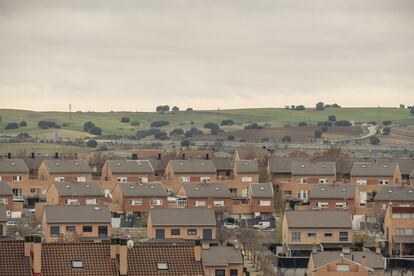
“I think that we’re on our way to a civil conflict, like in [19]36,” continues the police officer, who lives in Arroyomolinos. He greets a friend who walks by. The man is built like a tank. He’s a colleague from the riot squad who has just come back from Girona, where he was sent during the recent disturbances in Catalonia. This man tells stories of youngsters who throw stones at the police, run off and then burst into tears when they get caught. “People are terrified,” the man with the baby stroller concludes. “Including me. I don’t think that we’re better off than our parents.” A kiddie train full of children passes by through the mall.
9. The richest 1%
The light glints off the braces in her mouth when she smiles. “Santi, for me, is…” she says, in reference to Vox leader Santiago Abascal. “I’m his number-one fan.” Pilar de la Puerta is 18 years old. She studies business administration and business digital economy at Villanueva University, a private school with “deep Christian roots.” She finished her exams yesterday.
Born and brought up in Seville, and the daughter of a bull breeder, she’s been living in Pozuelo de Alarcón in Madrid for the last five years. The area has the highest per capita income in the whole country.
The meeting takes place at her uncle and aunt’s house, which is located in La Finca, an area best known for being home to soccer players and their mansions. It also has a reputation for being one of the most conservative areas in Spain. At the elections, the conservative Popular Party won with 56% of the vote, followed by Vox (29%) and Ciudadanos (Citizens) (10%). Right-wing parties took a total of 95% of the vote. Residents here are part of the richest 1% of Spain.
De la Puerta is wearing a leather jacket, a floral-print skirt and boots. She studied at an Opus Dei school and is planning on spending her vacation days on her grandparents’ ranch, where she likes to ride horses. Given her age, she’s only voted once in her life. She had no doubts who to back. She calls her family “very right-wing.” They were PP voters until Vox arrived on the scene. “[The party] are people from the countryside, traditional, anti-abortion, like my own family,” she says. “We feel that they really reflect us. They represent our values.”
What are those values?
“Family, God, the homeland.”
For her, Catalonia is a key part of this. “It’s the only party that says [Catalonia] won’t separate.” She says she “loves” Santiago Abascal, because, although he appears to be “quite a brutish guy,” he has “really clear ideas.” “He conveys a lot of certainty and confidence, a reassurance that we are going to fight and we are going to do this, Spaniards.” She also likes Vox’s leader in Madrid, Rocío Monasterio. “She’s very sweet and I see her like a mother, helping everyone with that smile of hers.” She likes Vox in general. “They come across as humble, honest family people, who educate their children with values, in the Christian religion; you can tell they’re good people.”
Pilar has been to a number of events and demonstrations. “To the ones in Colón [Square in Madrid], always. I love to go there and shout, ‘I’m Spanish, I’m with Vox!’ Me and all my friends go with our flags to the rallies. Once I saw Santi like, just a meter away from me.” More than just voting for Vox, she says she feels “a part” of Vox. “It defines me,” she explains. “I go and I give it my all. It’s like going to a concert.”
She believes that some of the party’s success comes from their presence on social media. “They always have their Instagram account bang up to date,” she says. “We find out about everything because this is part of our day-to-day lives. A rally here, a rally there… And we all attend.”
There is another event that the traditional right-wing supporter rarely misses, and that’s the Rastrillo Nuevo Futuro, an antiques market that raises money for adoption homes for children. A group of well-turned-out señoras are here, browsing stands that offer lamps, cutlery and glassware. In the corner of the bar that serves blinis – “the best afternoon snack in the market” – is Ana, 73, a widow from Madrid who votes for Vox. A lawyer by trade, she used to help at the family advertising business, but today devotes most of her time to “social work.”
Ana voted for the PP since the party was born, until she grew disenchanted with former Prime Minister Mariano Rajoy. She still likes the party’s ideas, but says that they “are not determined to defend them.” She refers to the issues of abortion, historical memory, and the “decaffeinated” Article 155 that was implemented in Catalonia (the constitutional provision used to suspend regional powers after the illegal referendum and unilateral independence declaration of 2017).
“Vox is a reaction to the state that Spain is in,” she says. “There is tension, but less than with 23-F,” she argues, in reference to the attempted coup by Civil Guard officers on February 23, 1981. “Many people are scared, on the left and on the right.” A friend of hers who also voted for Vox, adds another piece of information. Abascal, she says, fixing the reporter with her feline eyes, has “balls of steel.”
Weeks later, Ana receives us in her apartment, in the upscale Salamanca neighborhood of Madrid. The building where she lives is within a census section where the richest 1% live, and right-wing parties account for 80% of the vote. The door is opened by Mauricio, a “service person.” She sits on the sofa next to a pennant with the Spanish flag, and confesses that she is afraid someone might “let off a shot,” or that “someone might have the terrible idea of assassinating a politician.”
Despite the tough issues being discussed, the conversation is a pleasant one. To her, the “far right” would be people like the members of Guerrilleros de Cristo Rey, a paramilitary group that operated in the 1970s: “People who not only had right-wing ideas, but who were semi-terrorists.” The far left, unfortunately, is starting to sneak into the government,” she says. She complains about the WhatsApp messages that are bandied around “like lit rockets,” often containing false information. On a table there is a photo signed by former Spanish Prime Minister José María Aznar and his wife, the one-time Madrid Mayor Ana Botella, with whom she is still friends. But Vox has entered like a hurricane within her social circles. “Many friends of mine have changed their vote,” she explains. Even Mauricio is a Vox supporter, she says. But he couldn’t vote on November 10, she adds. Because he is Colombian.
The spark behind Vox

Political disaffection, a feeling of abandonment and the question of Spanish identity are the keys to the rise of the far-right party in Spain
When Vox was born, its voters were already there – they just didn’t know it yet. It was December 2013, and around that time, a third of Spaniards believed that the Spanish system of devolved power to the regions needed to be reversed, or power recentralized, according to a poll by the Spanish public research institute CIS. Unemployment, corruption and politicians were Spaniards’ main concerns, in that order. More than 50% of people surveyed in 2014 agreed with the statement: “Immigrants take work away from Spaniards.” Some 23% of people questioned voiced “little or no sympathy” with feminist movements, and 28% had “little or no” sympathy for gay and lesbian organisations,” according to a 2010 poll. In a 2012 poll, 47% viewed the Gender Violence Law as “just a little or not at all” efficient, and 60% were “very or reasonably in agreement” with the idea that some women file false police reports “to obtain economic benefits or cause damage to their partners.”
When Vox arrived on the scene there were some 4.7 million people out of a job in Spain. The traditional right-wing group in Spanish politics, the Popular Party (PP), was embroiled in a number of corruption scandals and court cases. Fiscal pressure had been on the rise since the start of the economic crisis, and more than 180,000 companies had gone under. More than 80% of the population considered the political and economic situation to be “bad or very bad” And there was a vacuum: when citizens were asked if they were right-wing or left-wing, 29% answered they “didn’t know” or had “no answer.”
The demand was there. The supply was missing. Vox was registered as a party in 2013. A year later, its current leader Santiago Abascal would take the reins. At the first two general elections that Vox ran in, in 2015 and 2016, the party picked up around 50,000 votes. At the third, in April 2019, it managed more than 2.6 million. At the most recent, in November 2019, it took 3.6 million, becoming the third-most powerful force in Congress.
Kiko Llaneras, an engineer and an analyst for EL PAÍS, has been examining the data, statistics and surveys about Vox in recent times. He calls for “caution” when looking at the group’s supporters, because the electorate behind each party can vary greatly. But he adds that you can see at least three different types of supporter within Vox.
He calls the first one the “ideological or identity voter.” “People who define themselves as right-wing, who believe that society defines them as such, and who feel that Vox is the party that represents their own. They exist in Madrid and in other big cities such as Seville.” For them, the separatist conflict in Catalonia and national identity have been key, although both issues have been a catalyst for all kinds of people.
The second profile, common to the Andalusian and Mediterranean coasts, includes “people who live in relatively poor areas of Spain where there is a high level of immigration and a lot of people work in the countryside.” Huelva, Almería and Murcia are clear examples.
The third profile, Llaneras concludes, is perhaps the most difficult to define, and probably the most interesting to research given the similarities with France’s “yellow vest” movement, Brexit supporters in the United Kingdom, and Trump voters in the United States. A kind of big loser from the Great Recession, in the main this voter is a man aged between 35 and 50 – the demographic where Vox has had the most success – with a reasonable level of studies and a relatively high income.
“These are people who, when they entered the job market and started a family, found themselves dealing with one of the biggest crises this country has ever experienced. They probably had very different expectations as to how their lives were going to turn out.” This profile is to be found on the outskirts of major cities and could explain the strength of Vox in the south of Madrid, filled with dormitory towns that expanded the capital in the boom years.
The economist Thomas Piketty explains in a recent book, titled Capital and Ideology, that the rise in the feeling of abandonment of the middle and popular classes, and attitudes of ethnic divisions, have a direct relationship with the rise in inequality in the West since the 1980s. Brexit and the election of Donald Trump, with his proposals of building walls and “making America great again,” he argues, are phenomena that stem in part from this dissatisfaction. The intensity of this relationship between the economy and populism is perhaps one of the big questions of our times.
“The revenge of the forgotten places,” is how Andrés Rodríguez-Pose, a professor of economic geography at the London School of Economics, describes it. He has analyzed countless electoral districts in Europe and the US in search of an explanation for populism. “There are a lot of areas that receive less and less investment, fewer services, that have grown much less than average, have lost jobs, productivity, have much less of a future, and have not been offered any kind of solution,” he explains. “These are the places that today are pushing back, that are saying, ‘The system no longer benefits us.’ They’ve been on the decline for a long time and with the spark of the crisis they have rebelled and have opted to vote for extremes, and in particular the far right, anti-establishment parties with a populist slant.” With that vote, Rodríguez-Pose adds, they are saying: “If I have no future, neither will you.”
In his opinion, “populism” in Europe is proposing a “trinity” that is attracting people from these “places that don’t matter.” “A narrative that is anti-elite, anti-immigrant, and anti-European.” The three vectors generate binary thinking: the idea of “us against them,” something that is easy to understand, rather than tackling the real challenges posed by globalization, migration, precarious employment, technology…
“We are leaving very complex problems that require a huge level of coordination in the hands of prophets who are selling very simple solutions,” he explains. And he warns that this generalized discontent, in particular “with politics and democracy,” is the “perfect cocktail for leaders who have a messianic streak to take advantage, come to power and transform society.”
Information against hoaxes
Since it was formed, Vox has spread a number of claims that do not stand up to data or proven facts. Here are several examples.
1. Immigration
No migrants receive funds just for having managed to reach Spain. They do get basic humanitarian aid, according to a royal decree passed in 2007. Nor do they receive social benefits before Spaniards do. These are awarded according to objective criteria according to applicants’ income and level of vulnerability, and this independent of their origin. Anyone with legal residency can apply for Social Security benefits, according to Spain’s Immigration Law, and according to the principal of non-discrimination enshrined in the Universal Declaration of Human Rights, which Spain has incorporated into its Constitution.
2. Safety
Spain was the third-safest country in Europe in 2017, according to Eurostat. Between 2008 and 2018, the crime rate was down from 51.9 offenses per thousand inhabitants to 44.1. In this period of time the percentage of foreign residents of the total population of Spain fell from 11.3% to 10.1%, according to the country’s National Statistics Institute (INE).
3. Climate change
There is scientific consensus about the man-made causes of global warming. The most trustworthy studies are carried out by the Intergovernmental Panel on Climate Change, a United Nations body.
4. Gender violence
The Istanbul Convention, which was ratified by Spain; the UN, and Spanish legislation all recognize the existence of specific violence against women, something that is different from domestic violence. Convictions for false reports of gender violence account for 0.01% of the total, according to the Prosecutor General’s Office. According to Spain’s legal watchdog, the CGPJ, 70% of rulings in gender violence cases ended with a conviction in 2018. Of those found guilty of sexual offenses in 2017, 75% were Spanish.
English version by Heather Galloway and Simon Hunter.
